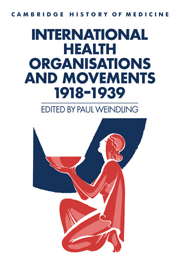Book contents
- Frontmatter
- Contents
- Notes on the contributors
- Preface
- List of abbreviations
- 1 Introduction: constructing international health between the wars
- 2 ‘Custodians of the sacred fire’: the ICRC and the postwar reorganisation of the International Red Cross
- 3 Red Cross organisational politics, 1918–1922: relations of dominance and the influence of the United States
- 4 The League of Nations Health Organisation
- 5 Assistance and not mere relief: the Epidemic Commission of the League of Nations, 1920–1923
- 6 Wireless wars in the eastern arena: epidemiological surveillance, disease prevention and the work of the Eastern Bureau of the League of Nations Health Organisation, 1925–1942
- 7 Social medicine at the League of Nations Health Organisation and the International Labour Office compared
- 8 The Social Section and Advisory Committee on Social Questions of the League of Nations
- 9 ‘Uncramping child life’: international children's organisations, 1914–1939
- 10 The International Health Division of the Rockefeller Foundation: the Russell years, 1920–1934
- 11 The cycles of eradication: the Rockefeller Foundation and Latin American public health, 1918–1940
- 12 The Pasteur Institutes between the two world wars. The transformation of the international sanitary order
- 13 Internationalising nursing education during the interwar period
- 14 Mental hygiene as an international movement
- 15 Mobilising social knowledge for social welfare: intermediary institutions in the political systems of the United States and Great Britain between the First and Second World Wars
- Index
- Cambridge History of Medicine
15 - Mobilising social knowledge for social welfare: intermediary institutions in the political systems of the United States and Great Britain between the First and Second World Wars
Published online by Cambridge University Press: 05 November 2009
- Frontmatter
- Contents
- Notes on the contributors
- Preface
- List of abbreviations
- 1 Introduction: constructing international health between the wars
- 2 ‘Custodians of the sacred fire’: the ICRC and the postwar reorganisation of the International Red Cross
- 3 Red Cross organisational politics, 1918–1922: relations of dominance and the influence of the United States
- 4 The League of Nations Health Organisation
- 5 Assistance and not mere relief: the Epidemic Commission of the League of Nations, 1920–1923
- 6 Wireless wars in the eastern arena: epidemiological surveillance, disease prevention and the work of the Eastern Bureau of the League of Nations Health Organisation, 1925–1942
- 7 Social medicine at the League of Nations Health Organisation and the International Labour Office compared
- 8 The Social Section and Advisory Committee on Social Questions of the League of Nations
- 9 ‘Uncramping child life’: international children's organisations, 1914–1939
- 10 The International Health Division of the Rockefeller Foundation: the Russell years, 1920–1934
- 11 The cycles of eradication: the Rockefeller Foundation and Latin American public health, 1918–1940
- 12 The Pasteur Institutes between the two world wars. The transformation of the international sanitary order
- 13 Internationalising nursing education during the interwar period
- 14 Mental hygiene as an international movement
- 15 Mobilising social knowledge for social welfare: intermediary institutions in the political systems of the United States and Great Britain between the First and Second World Wars
- Index
- Cambridge History of Medicine
Summary
We constantly speak about the State or our Society under terms of social organism; more, we talk of the State as if it were a person. But it is a person with a great number of totally detached centres of consciousness; with very little of anything like what could be called a centre of self-consciousness. The individual when we meet him, if he is troubled with any disease, is often painfully anxious to ascertain what his disease is and the way of curing it. But our society sits like a gigantic fat man troubled with all kinds of maladies and diseases in all the various parts of his enormous person; but the pain which each part of the organism suffers is uninvestigated and unremedied because the central consciousness is so remarkably weak. And what we want today is to strengthen the central consciousness that we may both know what are the diseases under which the various parts of the body are suffering and set ourselves with something more of seriousness to investigate the remedy.
(Charles Gore, Bishop of Oxford, 1914)Introduction
The development of the application and use of scientific research — including natural science, medicine and social science — in relation to government and policy-making is a twentieth-century phenomenon.
- Type
- Chapter
- Information
- International Health Organisations and Movements, 1918–1939 , pp. 305 - 325Publisher: Cambridge University PressPrint publication year: 1995
- 2
- Cited by



